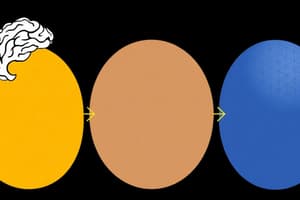Podcast
Questions and Answers
Which stage of cognitive development is characterized by symbolic thought and language?
Which stage of cognitive development is characterized by symbolic thought and language?
- Sensorimotor Stage
- Formal Operational Stage
- Concrete Operational Stage
- Preoperational Stage (correct)
Which stage involves difficulty understanding that others may think differently?
Which stage involves difficulty understanding that others may think differently?
- Preoperational Stage (correct)
- Formal Operational Stage
- Concrete Operational Stage
- Sensorimotor Stage
In which stage do children start to use symbols to represent objects and ideas?
In which stage do children start to use symbols to represent objects and ideas?
- Preoperational Stage (correct)
- Concrete Operational Stage
- Sensorimotor Stage
- Formal Operational Stage
Which stage involves the development of object permanence?
Which stage involves the development of object permanence?
At which stage do children begin to use logical thought to solve problems involving conservation?
At which stage do children begin to use logical thought to solve problems involving conservation?
Which stage allows children to use logical operations to solve abstract problems?
Which stage allows children to use logical operations to solve abstract problems?
At what age range do children typically begin the Concrete Operational Stage of cognitive development?
At what age range do children typically begin the Concrete Operational Stage of cognitive development?
Which stage of cognitive development is characterized by children using logical thought and understanding concepts like time and number?
Which stage of cognitive development is characterized by children using logical thought and understanding concepts like time and number?
In which stage of cognitive development do children develop the ability to understand that others may think differently than they do?
In which stage of cognitive development do children develop the ability to understand that others may think differently than they do?
Which is a key feature of the Preoperational Stage of cognitive development?
Which is a key feature of the Preoperational Stage of cognitive development?
What is a defining characteristic of the Formal Operational Stage of cognitive development?
What is a defining characteristic of the Formal Operational Stage of cognitive development?
Which stage of cognitive development involves progressing from inborn motor reflexes to understanding object permanence?
Which stage of cognitive development involves progressing from inborn motor reflexes to understanding object permanence?
Study Notes
Piaget's Stages of Cognitive Development
Jean Piaget, a renowned Swiss psychologist, is best known for his theory of cognitive development in children. He believed that cognitive development is not just about acquiring knowledge, but also about the child's active construction of a mental model of the world, which he called a "schema". Piaget classified cognitive development into four distinct stages, each representing varying cognitive abilities and world comprehension:
-
Sensorimotor Stage (Birth to 2 years): This stage is divided into 6 substages, starting with inborn motor and sensory reflexes and progressing to the development of object permanence and the ability to experiment with the environment.
-
Preoperational Stage (2 to 7 years): Children in this stage begin to use symbolic thought and language. They start to imitate and pretend play, and develop egocentrism, which means they have difficulty understanding that others may think differently than they do.
-
Concrete Operational Stage (7 to 11 years): Children in this stage begin to use logical thought and are able to solve problems involving conservation and inductive reasoning. They can understand concepts like time, number, and the idea of reversibility.
-
Formal Operational Stage (11 years and beyond): This stage is characterized by scientific reasoning and the ability to understand abstract concepts like love and justice.
The Sensorimotor Stage
In the sensorimotor stage, children focus on physical sensations and learning to coordinate their body. They develop a range of cognitive abilities, including object permanence, which is the ability to understand that objects exist even when they are not present. This stage is marked by the development of motor skills, such as grasping and reaching, and the ability to understand cause-and-effect relationships.
The Preoperational Stage
The preoperational stage is characterized by the use of mental representations, such as symbolic thought and language. Children in this stage start to imitate and pretend play, and develop egocentrism, which means they have difficulty understanding that others may think differently than they do. They also begin to use symbols to represent objects and ideas.
The Concrete Operational Stage
During the concrete operational stage, children begin to use logical thought to solve problems involving conservation and inductive reasoning. They can understand concepts like time, number, and the idea of reversibility. They start to think more systematically and logically, but their thinking is limited to concrete, real-world situations.
The Formal Operational Stage
The formal operational stage is the final stage in Piaget's theory of cognitive development. In this stage, children can use logical operations to solve abstract problems and understand theories, hypothesize, and comprehend abstract ideas. This stage marks the transition from childhood to adolescence and adulthood.
Piaget's theory has been influential in understanding the development of cognitive abilities in children, and his stages of cognitive development continue to be widely studied and discussed in the field of psychology.
Studying That Suits You
Use AI to generate personalized quizzes and flashcards to suit your learning preferences.
Description
Test your knowledge on Jean Piaget's theory of cognitive development in children, including the sensorimotor, preoperational, concrete operational, and formal operational stages. Explore concepts like object permanence, egocentrism, conservation, and scientific reasoning.




